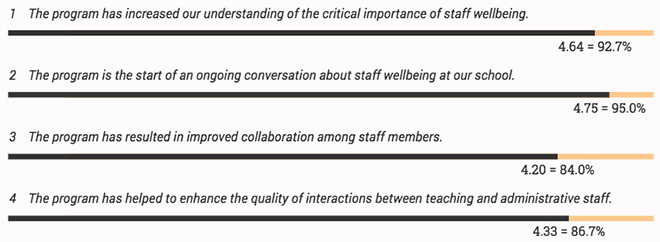NESLI Wellbeing Tookit has positive effect on mental Health in schools
National Excellence in School Leadership Initiative (NESLI)’s Staff Wellbeing Toolkit is having a profound impact on the mental health of Australia’s schools, according to the Interim Impact Report published on 21 September. As a result of doing the 5 module program, schools reported a marked quantitative improvement in understanding the importance of wellbeing, improving collaboration amongst staff and enhancing the quality of interactions between teachers and administrators.
The Wellbeing Toolkit is based on a blend of direct instruction and broader social-constructivist theory, with a particular focus on dialogic learning and self-discovery. The learning outcomes in each module work through Biggs’ SOLO (Structure of Observed Learning Outcomes) model, from surface-level learning via identification, articulation, description and recognition, through to the deeper (relational and extended/abstract) learning associated with interpretation, relation, discussion, planning, application and evaluation.
To date the Toolkit has been completed by school employees in 180 schools. Participants were asked to assess each module on a 1-5 scale (with 1 being the lowest and 5 being the highest).
Asked whether each module ‘gave new insights into improving personal wellbeing’, the average score was 4.1 out of 5 (82%). Asked whether each module ‘gave new insights into improving team/group wellbeing’ the average score was 3.75 out of 5 (75%). Participants also experienced a 21% increase in positivity scores throughout the program.
Each participating school is provided with a Wellbeing and Social Capital Report which contains useful data as to how the learning institution is performing across a number of important dimensions.
“We are extremely pleased that the Wellbeing Toolkit is achieving positive results for participating schools,” said Damien Farrell, NESLI National Director.
Toolkit Leader post-program survey
Participating schools nominated one or more Toolkit Leaders to facilitate peer learning sessions and provide a project management role throughout the program’s implementation. In order to obtain meaningful feedback from Toolkit Leaders, a five-point Likert scale is used where 1 = strongly disagree and 5 = strongly agree.
 NESLI has committed $750,000 over three years to ensure that the Wellbeing Toolkit is fully resourced.
NESLI has committed $750,000 over three years to ensure that the Wellbeing Toolkit is fully resourced.